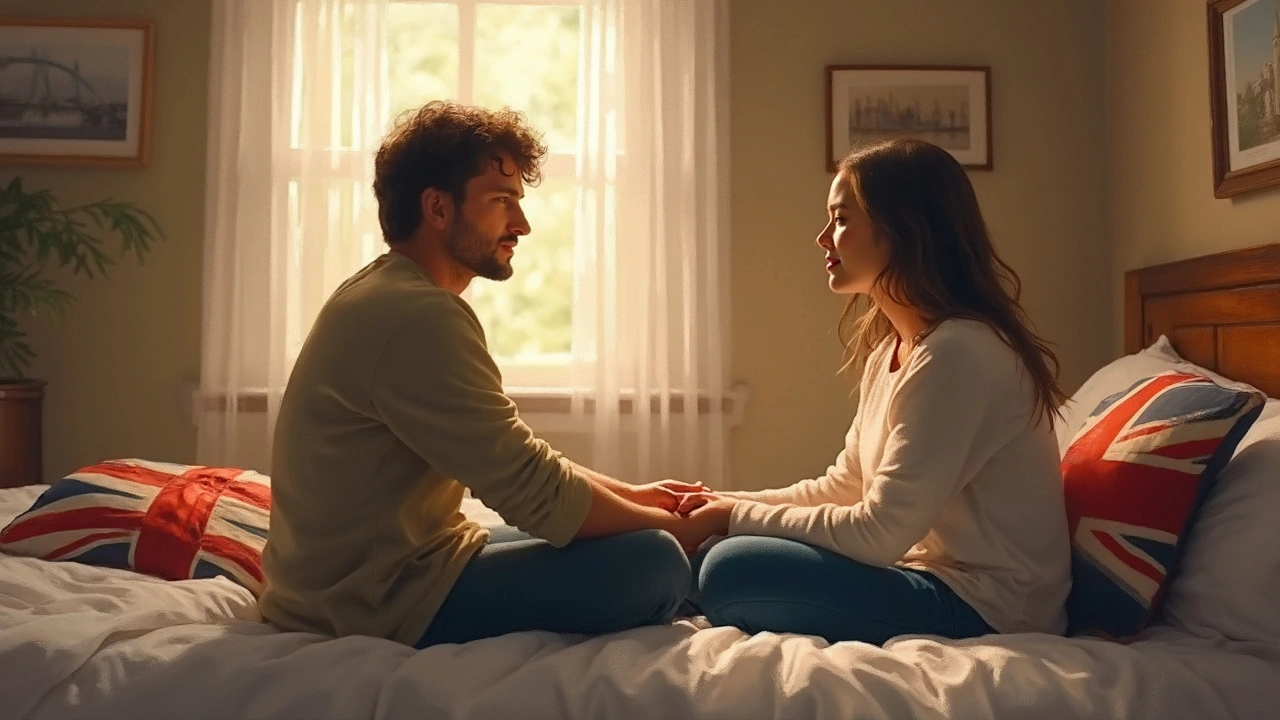Picture this: you're finally in the mood, and just as things start heating up, you’re hit with that unmistakable stab or ache deep in your bladder. So much for a romantic evening. Here’s the thing—bladder pain and sex are a duo way more people deal with than you’d guess. No one brings it up at brunch, but if it’s happening to you, it can feel isolating and even a little embarrassing. What the magazines don’t tell you is that you’re far from alone. Around one in seven women and plenty of men cope with pelvic pain that messes with their sex life. That’s not some rare, hush-hush problem; it’s as common as hay fever. If your bladder is acting up, and you’re caught between craving closeness and dreading discomfort, you’re in the right place for honest tips and facts you can actually use.
Why Does Sex Hurt When You Have Bladder Pain?
Let’s get into the nuts and bolts. Bladder pain during or after sex isn’t just “in your head.” In fact, there’s a laundry list of reasons people can experience it. Interstitial cystitis (IC) often tops that list, with up to one in 50 Aussie women being told they have it at some stage. IC’s symptoms—constant urge to wee, pelvic ache, pressure—can turn the anticipation of sex into anxiety. And it’s not just IC. Urinary tract infections (UTIs) can cause burning, cramping, and—yep—even more pain during sex. Sometimes, the bladder pain comes from pelvic floor muscles that are tight, overworked, or inflamed. These muscles support not only your bladder but also your reproductive organs. When they’re on edge, sex can trigger a flare-up.
A lot of folks don’t realize that hormonal changes—like menopause, pregnancy, or even monthly cycles—can make bladder tissues sensitive or dry, too. Some people find condoms, lubes, or soaps spark allergies or irritation. Painful sex isn’t just physical, either. If you’ve had bad experiences, your body can tense up before you’re even undressed, and that muscle tension alone can set off bladder discomfort. It’s a vicious circle. Pain makes you anxious. Anxiety tightens your muscles. Tense muscles trigger more pain. You see where this is going.
Men can struggle with bladder pain during sex as well. Prostatitis, or inflammation of the prostate, is a classic culprit, and can make sex feel like a hazard zone. Add stress, dehydration, or even certain medications, and suddenly your romantic plans are derailed. What’s wild is most people don’t get offered straight answers from their doctors. Instead, they get told to “relax” or “drink more water.” Not terribly helpful, right?
If you’re tired of vague advice, here’s a reality check: the first step to less-painful sex is to figure out your triggers. Track when you hurt, what makes it worse, and what helps—no detail is too tiny. Be honest with yourself. Does pain start with certain positions, deep penetration, or even beforehand? Did you drink coffee, have spicy food, or forget your usual meds? Patterns matter. Start jotting down what you notice. The more specifics you can give your doctor (or pelvic floor physio), the sooner you can land on something that actually works. And yes, there really are solutions.
How to Talk About Painful Sex With Your Partner
Nobody enjoys having the “we need to talk” talk about bedroom problems, especially when it involves pain. But not talking about it? Way worse. If your bladder flares up every time you try to get intimate, pretending it’s not happening builds distance, frustration, and guilt. Nine out of ten people admit to faking enthusiasm to make their partner feel better—even when they’re suffering. That only works for so long before resentment sets in.
So here’s the key: ditch the taboos. You don’t have to haul out a diagram and laser pointer, but being real is powerful. Start when you’re comfortable and not in the middle of anything sexual. Say something honest, like, “I really want to enjoy this with you, but I get this pain that makes it hard. I’m working on it, and your support helps.” If vulnerability scares you, remember, most people would much rather know what’s up than be left second-guessing themselves. Honesty lays the foundation for teamwork—and teamwork is where intimacy shines.
Your partner might feel helpless or even guilty at first. It’s okay. Encourage questions. Offer details that help, but shut down any blame. Let them know what actually helps you: “I like when we take things slow,” or “It helps if we use more lube,” or “Can we try a different position?” If you’re not sure what helps, figure it out together. Make it fun—turn experiments into part of foreplay. Remember the golden rule: if something hurts, speak up. Your body isn’t lying.
And don’t feel boxed into what sex “should” look like. Some couples get more creative and closer because of health hiccups. If actual penetration isn’t on the menu, there’s a smorgasbord of other ways to connect: intimate massages, skin-on-skin contact, oral, toys, or just making out like teenagers. The goal isn’t to endure pain for your partner—it’s to find pleasure as a team, no matter what that looks like today. Communication brings relief in ways no pill or cream ever could. Most couples find that being open about pain often leads to a better (and sometimes even wilder) sex life down the road.

Practical Tips for Enjoying Sex Despite Bladder Pain
Let’s get down to what everyone wants—actual hacks for less-painful, more satisfying sex. Here’s the first tip: bladder pain doesn’t own you, so take back control where you can. A lot comes down to prepping your body, trying new routines, and using smart tools or techniques. Here’s a grab-bag of real-world strategies that people swear by:
- Tweak the timing: Bladder pain tends to flare at certain times—after a tough workday, when you’re tired, if you’re stressed or dehydrated. Pay attention to the time of day you feel best. Many folks find mornings are golden, before coffee or triggers set in.
- Pick your position: Some positions put pressure on the bladder or pelvic muscles. Try ones where you control depth and angle, like being on top, side-lying (‘spooning’), or with a pillow under your hips. Go slow. Communicate what feels okay.
- Embrace lube—seriously: Dryness and friction make everything worse for sensitive tissues. Water-based lubricants work for most, but if you have allergies, give silicone-based a try (they last longer). Avoid fragranced or flavored kinds—they’re more likely to irritate.
- Empty your bladder first, but not obsessively: Pee before sex. That takes pressure off the bladder. But don’t force it—an empty bladder can hurt just as much as a full one, so listen to your body’s cues.
- Heat and relax: A warm bath or using a heat pack before sex relaxes the pelvic floor and calms nerves. Just 10 minutes can make a big difference. Gentle stretching or pelvic floor exercises (especially the “drop” or relaxation moves, not squeezes) may also ease tension.
- Watch what you eat and drink: Coffee, citrus juice, alcohol, spicy food, and fizzy drinks all rile up sensitive bladders. Eating bland and hydrating with plain water on ‘date night’ is surprisingly effective for some.
- Try topical numbing (if your doctor okays it): Some people use lidocaine gel on the vulva or around the urethra to block nerve pain. It’s prescription only, and not sexy, but it can help people desperate for relief.
- See a pelvic floor physio: These are miracle workers. They teach you how to relax, stretch, and soothe the exact muscles causing pain. A personalized care plan (often through NDIS or private health) actually fixes root causes for a lot of people.
- Don’t power through pain: If something feels wrong, stop. Take a break, change positions, or just cuddle. Penetration isn’t the only way to be intimate. Many couples discover whole new likes and kinks when forced to innovate.
- Hydration matters: Drink enough water in the day, but if drinking heaps right before sex always makes you dash for the loo, taper off for an hour or so beforehand. Everyone’s bladder has its own capacity–learn yours and adapt.
- Toys for comfort and fun: Some vibrators or massagers made for external use help distract from pain and make nerves send ‘pleasure’ signals instead. Just avoid anything that’s too strong or causes numbness.
- Plan for aftercare: Gentle wipes, warm compresses, a drink of water, and shared downtime can help symptoms settle. If you’re prone to UTIs, urinate after sex and wear loose clothing.
Boring sex is never the goal—but neither is pushing through agony. The best way to enjoy intimacy with bladder pain is to mix curiosity, creativity, and self-compassion. You change your routine for the gym or for allergies, so why not adapt the bedroom, too? Don’t let old-fashioned myths tell you what intimacy should look like. Plenty of people rediscover what turns them on simply by being forced to slow down, try new things, and focus on each other in new ways. Think of pain as a clue—not a stop sign.
When to Seek Medical Help (And How to Advocate for Yourself)
Here’s the raw truth: if you’ve adjusted your routine, tried the ‘common sense’ tips, and sex still hurts, it’s time to tag in a pro. Many GPs have heard “sex hurts” before, but not all know the right follow-up questions. Don’t let that stop you. Bladder pain with sex isn’t just an annoyance—left untreated, it can mess with self-worth, relationships, and even cause depression or anxiety. You deserve care that works.
Arm yourself with details. Use your symptom diary to lay out what happens, when, and what you’ve already tried. If the doctor suggests it’s “just stress,” push back if that doesn’t feel right. Ask for referrals to a gynaecologist, urologist, or pelvic floor physio. Diagnostic tests (like urinalysis, cystoscopy, or pelvic ultrasound) can rule out conditions like infections, bladder stones, or endometriosis. Don’t stop until you feel listened to.
For folks with recurring UTIs, insist on cultures to make sure the antibiotic matches the bacteria. Chronic pelvic pain may be managed best by a team: medical specialists, pain clinics, physiotherapists, and—if you’re game—sex therapists who specialise in pain disorders. In Australia, Medicare covers some allied health services if you ask your GP for a care plan. Don’t let cost be a barrier—public clinics exist, and many women’s health centers run free or low-cost advice lines.
Sometimes, standard medicine isn’t enough. Acupuncture, mindfulness meditation, or gentle yoga are popular with people who swear it eases their pelvic pain and helps their sex life get back on track. There’s no shame in seeking out what works for you—even if it’s not what your GP first suggests.
One more myth to smash: you don’t have to “put up with” pain because it’s rare or makes you feel broken. Bladder pain and sex can coexist—not perfectly, but better than most people believe. Honest talk, clever tweaks, and expert help can turn a dreaded experience into one of exploration and, yeah, even fun. Your story isn’t over. If intimacy has gone missing, you and your partner get to define what it means to get it back.



Julie Sook-Man Chan
This article really hits the nail on the head about a topic people often shy away from. It's refreshing to see such honest and practical advice for dealing with bladder pain during intimacy. I've struggled silently for a while, and just knowing that there are ways to enjoy intimacy without discomfort is comforting.
One thing I appreciate is how it emphasizes communication with your partner. That can’t be overstated, right? It really helped me open up my relationship to better understanding and patience. Also, adjusting routines – small changes can make a surprisingly big difference.
Does anyone else have personal tips that worked well for them? Sharing experiences could be so supportive for others in this community.